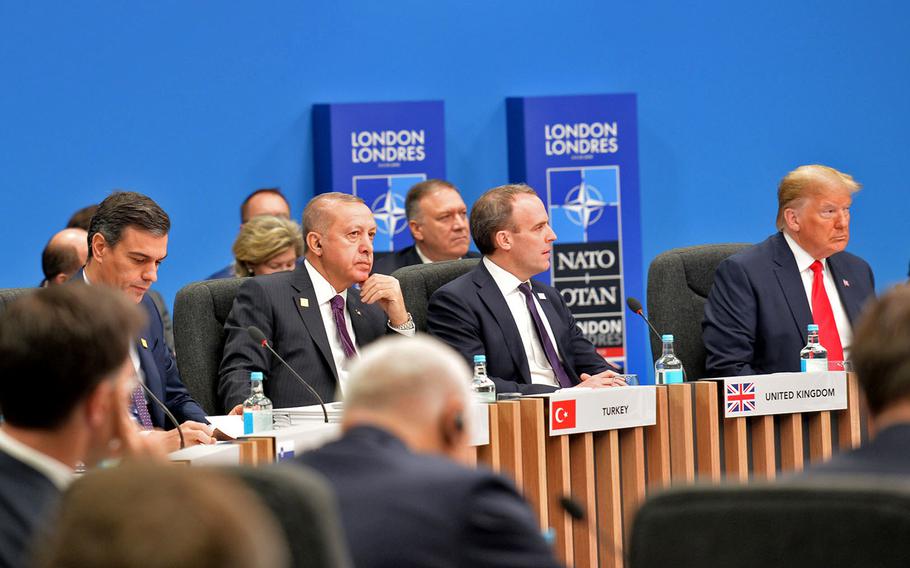
Turkish President Recep Tayyip Erdogan and President Donald Trump attend the NATO summit in London on Dec. 4, 2019. Turkey said it may block a NATO defense plan for the Baltics and Poland if allies do not designate Kurdish YPG forces as terrorists. (NATO)
STUTTGART, Germany — Turkey said it could still block a NATO defense plan for the Baltic states and Poland unless allies develop a security arrangement for the alliance’s southern flank that would brand Kurdish YPG forces who fought alongside Americans as terrorists.
Top Turkish diplomatic and defense officials say no compromises have been reached, contradicting an announcement by NATO Secretary-General Jens Stoltenberg last week during NATO’s leaders meeting in London that plans for the Baltics and Poland had been approved.
Baltic leaders last week hailed Turkey for supporting the defense strategy, which had been held up over Ankara’s demand that allies designate YPG forces as terrorists — something multiple allies, including the U.S. and France, have balked at.
A NATO official, speaking on customary condition of anonymity, said Wednesday that allies in London “approved advanced plans for defending the alliance.”
“These plans will now undergo some technical refinement,” the official said in a statement. “This is a regular part of the process before plans are finalized. NATO’s commitment to the safety and security of all allies is unwavering.”
However, Turkish Foreign Minister Mevlut Cavusoglu said that no agreement had been reached. Cavusoglu said updated defense plans, both for the Baltics and Turkey, must pass through NATO military councils before going into effect.
“So long as our plan (to designate YPG as a terrorist threat) is not issued, their plan will most certainly not be issued,” Cavusoglu told reporters in Rome on Friday. “It would be unfair if some countries supported the plan to defend the eastern flank and at the same time refused to agree on a similar plan for us.”
However, Krzysztof Szczerski, an aide to Poland’s president, told Reuters on Monday that there was “no going back from the decision made at NATO.”
“Decisions were made for both the Polish-Baltic and the Turkish plans and now we are waiting to implement the plans. That’s a military matter,” he said.
Turkey’s insistence on designating the YPG a terrorist group could drive a wedge between members. The Kurdish group was a key part of the U.S.-led coalition against the Islamic State in Syria, and French President Emmanuel Macron blasted Ankara for targeting those Kurdish forces.
“When I look at Turkey, they are fighting against those who fought with us shoulder-to-shoulder against ISIS, and sometimes they (Turkey) work with ISIS proxies,” Macron said in London.
The impasse underscores the wide range of disagreements among allies when it comes to Turkey.
Issues such as Turkey’s acquisition of Russian air defense systems and its closer coordination with Moscow in general have called into question Ankara’s status within NATO.
Defense Secretary Mark Esper has warned on multiple occasions that Turkey may be “spinning out of NATO’s orbit.”
vandiver.john@stripes.com Twitter: @john_vandiver